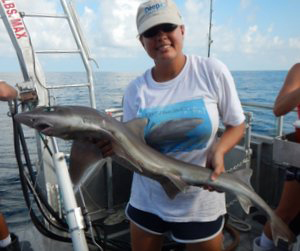
Johanna Imhoff

Department Profiles
I am a doctoral student in Dr. Dean Grubbs’ lab studying trophic ecology and ecotoxicology of deepwater sharks. The aim of my research is to investigate both intra- and interspecific competition for food in deepwater sharks by focusing on some of the more common species in the northeastern Gulf of Mexico. Smoothhound (Mustelus sp.), dogfish (Squalus sp.) and gulper (Centrophorus sp.) sharks are common mid-level predators ranging from the continental shelf to the mid-upper continental slope. I am using stomach contents and stable isotopes analyses to identify what prey these sharks are eating, their trophic positions and food web affinities in their various depth habitats. Mercury, specifically methylmercury, is a toxicant that is tightly tied to trophic ecology. Methylmercury bioaccumulates in food webs, increasing in concentration with each trophic level. As mid to upper trophic level predators, deepwater sharks have the potential to bioaccumulate high concentrations of mercury. In addition, these sharks are generally long-lived which may facilitate the long-term persistence of high levels of mercury contamination in the system. Coupling trophic studies with mercury analysis may help to explain patterns of mercury contamination in sharks across depth habitats in the northern Gulf of Mexico.
I find it thrilling to be able to work in the deep sea, which is a comparatively little-explored part of the world’s oceans and has been particularly under-studied in the Gulf of Mexico. For most of the species we encounter, many basic biological and ecological questions remain, and on nearly every research cruise I have encountered a species I have never seen before, including new records for the Gulf and even some that may be new to science. These experiences have reignited my fascination with natural history and taxonomy. In addition to my research on deepwater sharks, trophic ecology and ecotoxicology, I maintain active interests and collaborations in movement and migration ecology and conservation.